Our School of Statesmanship, Stewardship, and Service’s (SOSSAS) teaching curriculum instructs students on the nature of goodness in our midst. A specific class teaches that we can transform communities and organizations based on leveraging the goodness that already exists in those communities and organizations and that goodness is the most sustainable and powerful fulcrum for making wanted shifts.
While goodness as a force is invisible, we can readily see its effect with and on the visible. Goodness resides within people, as well as between and among people. The ideal of goodness extends beyond the idea of social duty and moral obligation. Goodness is reflective of the deep yearning to be of service to others.
Goodness is more compelling and able in its capacity to bring about changes we want to see than any other consequential influence there is; more than retribution; more than officially sanctioned power; more than wealth; and more than other secular powers. Goodness, when leveraged, has the power to alter energy, circumstances, relationships, and people. When goodness prevails, it activates what is possible in people, organizations, neighborhoods, communities, and even countries.
Goodness is unique in its nature. Goodness begets goodness. In other words, it can grow; it can expand within people and within communities. It could very well be considered a form of social capital. There are actual techniques SOSSAS teaches to cause and encourage goodness to expand. And the more goodness grows, the less space there is for self-interest, egocentric perspectives, the influence of material wealth, the domination of consumerism, and even evil.
Goodness is one of those forces that can be harnessed and can become the substance of structures, mechanisms, organizations, and institutions in ways that clearly uplift our society. It can be leveraged to enhance our well-being, strengthen our relationships, help resolve social and health concerns, harmonize contrasts, and be a soothing salve for tension, divisiveness, and polarizations.
On a personal level, people can be good people; they can reflect back the goodness in others, and they can help surface and activate the goodness in others. The goodness of one’s heart can be the cause of amazing and great things to happen.
Together, people can pool their goodness and create friendships, in turn, those friendships can exalt more goodness. Friendships, neighborhoods, and communities filled with goodness can foster social maturity, rob suffering of much of its sorrow, and hardship of much of its bitterness.
One last thing about goodness that SOSSAS teaches. We often define or characterize “greatness” in the context of performances and achievements. We hear statements like, “Wow, what a great athlete! “ or “What a great actor!” or “What a great photograph!” Perhaps there needs to be a new definition of greatness. Let’s define greatness by the content of its goodness!

